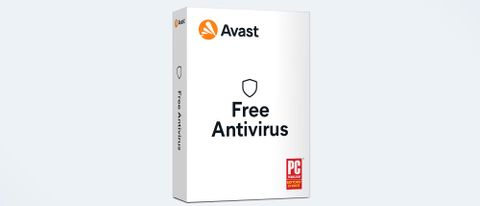Tom's Guide Verdict
Avast Free Antivirus offers a ton of features for a free antivirus program but has mediocre malware protection and a heavy system load.
Pros
- +
Wi-Fi scanner, password manager
- +
Customizable protection
Cons
- -
Slow scans
- -
Mediocre defenses
- -
Heavy system impact during scans
Why you can trust Tom's Guide
Updated with addition of Avast's Ransomware Shield. This review was originally published May 4, 2020.
Closer to a mini security suite than a basic free antivirus program, Avast Free Antivirus includes an unlimited password manager, a Wi-Fi network scanner and a silent gaming mode. It also gives you full control to adjust its sensitivity and customize its activities to match your wants and needs.
Malware protection: So-so
System impact, background: Light
System impact, scans: Heavy
Windows compatibility: 7 through 10
Email scans: Yes, as a separate free tool
File shredder: No
Game/silent mode: Yes
Hardened/secure browser: Yes, as a separate free tool
Password manager: Yes
Performance scanner: Yes
Ransomware file reversal: Shield only
Rescue disk: ISO built-in
Scan scheduler: Yes
Support options: FAQs, forums
URL screener: Yes, as a separate free tool
Upsell nag factor: Omnipresent
But be warned: Avast takes a long time to scan a computer and slows down the system during scans, and the program provides mediocre malware protection that's arguably worse than that of the built-in Microsoft Windows Defender. At least the company says it has stopped collecting and sharing anonymized data about how you use your PC.
Kaspersky Security Free Antivirus offers nearly as many extra features, top-notch malware protection and a nearly nonexistent system-performance impact. It's our choice for the best free antivirus software. If you can do without the extra features and would rather just "set it and forget it" with your antivirus software, then Bitdefender Antivirus Free Edition may be best for you.
Read on for the rest of our Avast Free Antivirus review.
Avast Free Antivirus: What's covered and upgrade options
Avast Free Antivirus supports only Windows 7, 8.1 and 10. For Windows XP or Vista, you can install an older version of Avast that might not have the latest features but will have the latest malware signatures.
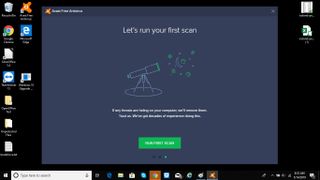
Think of Avast Free Antivirus as a security suite on the cheap. It includes features you don't normally find with free antivirus software, such as a password manager, a Wi-Fi network scanner, a gaming/movie mode to minimize interruptions, a limited performance scanner and, as of August 2020, a ransomware shield that prevents designated files from being altered.
Kaspersky Security Cloud Free also has a password manager, but it's limited to 15 entries before you have to pay for it.
Avast also sells paid antivirus programs. The cheapest is Avast Premium Security, which costs $60 a year for a single computer, or $80 for up to 10 devices (Windows, Mac or Android). It adds a firewall, a file shredder, an automatic software updater, webcam protection, defenses against spam and a secure folder that can protect key files in a ransomware attack.
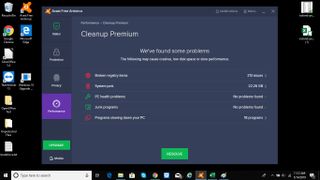
Avast's Ultimate program costs $100 yearly for a single PC. It includes unlimited versions of Avast's Cleanup, Passwords and SecureLine VPN programs, which would cost a total $130 if purchased separately.
Avast Free Antivirus: Antivirus protection
Avast Free Antivirus' malware scanner compares files and programs to a database of known malware and looks for telltale signs of an infection. Suspicious items are uploaded to Avast's lab for analysis, and new malware signatures are pushed out to Avast's 400 million users every few hours. Avast Free Antivirus also scans USB flash drives for malware.
The Avast Online Security extensions for Chrome and Firefox block known malicious websites and web trackers and examine webmail attachments, but the extensions must be downloaded on their own.
Avast Free Antivirus: Antivirus performance
Avast shares its malware-scanning technology with its sister company, AVG. Third-party lab tests reveal that both deliver acceptable but mediocre malware protection.
In all 26 monthly tests carried out in 2018, 2019 and the first two months of 2020 by the German lab AV-Test, Avast (and AVG) spotted 100% of both "widespread" known malware and "zero-day" unknown malware 14 times, which is commendable.
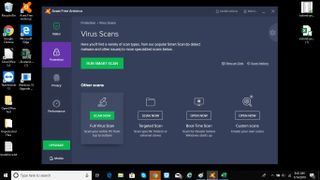
But it failed to detect at least 99.5% of zero-day threats nine times over those two years, which means that a significant amount of the worst kind of malware sailed right past Avast's defenses.
By comparison, Windows Defender missed more than 99.5% of zero-day malware only five times in those two-plus years. Bitdefender did so only twice. And Kaspersky detected 100% of both kinds of malware in all 26 tests.
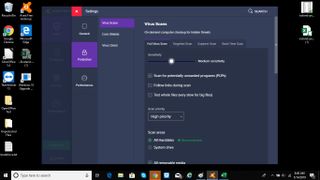
Avast's results on evaluations conducted by Austrian lab AV-Comparatives were also meh. Its average detection rate of "real-world" online malware from February through May of 2019 was 99.2%, well short of Kaspersky's 100% and Bitdefender's 99.9%, and less than the 99.6% scored by Microsoft.
In July through November 2019, Avast got an average of 99.3%, ahead of Kaspersky's 99.1% and tied with Microsoft (and AVG, naturally), but behind Bitdefender's 99.9%.
In February-March 2020, Avast stopped 99.7% of threats, again tying AVG and Microsoft. Bitdefender was behind with 99.5%, but Kaspersky aced it.
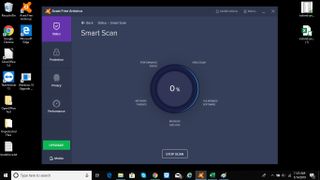
AV-Comparatives' tests elicited more false positives than AV-Test's, and Avast performed adequately, racking up only five in the first half of 2019, eight in the second half and five in February-March 2020.
In each half of 2019, Microsoft got 74 and 58, respectively, but suffered only five in February-March 2020 after AV-Comparatives turned off Microsoft's Smart Screen feature. On the other end of the spectrum, Kaspersky consistently got zero, indicating a very well-tuned detection engine.
Finally, Avast scored 98% overall in both of the last two quarterly rounds of 2019 evaluations by London-based SE Labs, which factors in false positives and how malware is handled after detection. Microsoft got 99% and 100% in those two rounds, while Kaspersky garnered 100% both times.
For SE Labs' January-March 2020 tests, Avast got 98%, same as AVG, while Microsoft got 99% and Kaspersky 100%. Bitdefender was not tested.
Avast Free Antivirus: Security and privacy features
Avast's Secure Browser is intended for online shopping or banking, but you'll need to download it separately. Based on Google's Chromium code, Avast's browser forces sites to establish a secure HTTPS connection if possible and doesn't allow extensions.
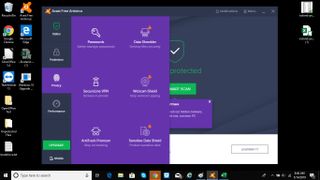
Avast's Passwords password manager holds an unlimited number of entries and works with Chrome, Firefox and Avast's Secure Browser. Passwords Premium costs an extra $20 (or comes with the Avast Ultimate paid package) and adds a data-breach monitor and fingerprint logins.
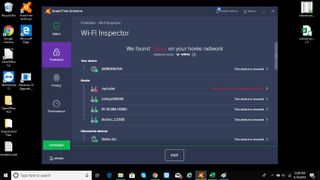
Avast's Wi-Fi Inspector examines your home network to compile a list of connected devices and ferret out old firmware, insecure passwords and incorrect settings. But Avast's SecureLine VPN client software, once built into Avast Free Antivirus, is now a separate download. It costs $60 a year; there's no more limited free option, but there is a 30-day money-back guarantee.
If a Windows computer is hopelessly infected, Avast Free Antivirus contains software to create a rescue disk on a flash drive or DVD that will boot the system into a secure Linux environment for scanning and repairs.
Avast Free Antivirus: Application-usage data collection
Until a few months ago, Avast and AVG notified you when you first launched the software that, with your permission, it would "collect anonymous data about your computer, network and the websites you visit" and that Avast "may share this data with 3rd parties for analytics purposes." You could opt out of that collection.
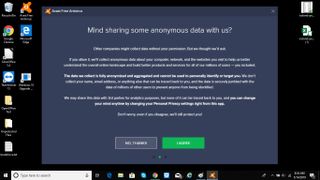
That was a long-standing practice, but a couple of media reports in January 2020 about where that collected data went generated a public outcry. Avast's stock price tanked, the company said it would end the practice, and the data-collection notification window no longer appears when you first launch Avast Free Antivirus.
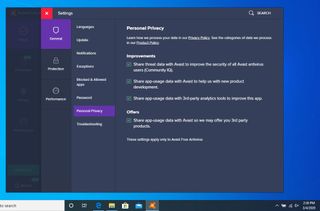
However, there are a couple of new items buried in the "Personal Privacy" part of the Settings. You can now choose whether to share threat data with Avast; to share application-usage data with Avast to "help us with new product development"; to share application-usage data with 3rd-party analytics tools; and to share application-usage data with Avast "so that we may offer you 3rd-party products."
Those last two items sound rather like what Avast said it would no longer do. An Avast spokeswoman clarified to us that Avast no longer shares user data with third parties for purposes of analyzing broader trends in business and marketing, rather than for specifically analyzing the performance and use of Avast's own software.
We realize that Avast Free Antivirus offers a lot for free, but we recommend turning off anything that would result in your data being shared with third parties, even if that data is aggregated and anonymized.
Avast Free Antivirus: Performance and system impact
Avast's Free Antivirus is not only one of the most resource-hungry AV programs we've encountered but is also one of the slowest to scan a drive.
To check system performance, we used our custom benchmark test, which measures how long the CPU takes to match 20,000 names and addresses in an Excel spreadsheet. We used an Asus X555LA notebook with a 2GHz Core i3-5005U processor, 6GB of RAM, 59.5GB of files on a 500GB hard drive and the latest version of Windows 10.
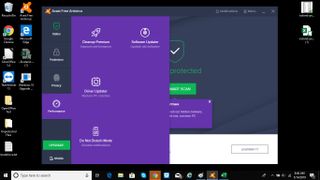
Before loading Avast Free Antivirus, we established a baseline score by measuring the benchmark's completion time at an average of 13.7 seconds. After we installed the program, but without an active scan running, the completion time slowed to 14.3 seconds, indicating a 4.3% background decline in performance.
Active scans exact a heavier toll. Our benchmark's average completion time was 17.7 seconds during Avast's full scans, a drop in performance of 24% from the background level, and 29% from the baseline before Avast was installed.
Bitdefender Antivirus Free Edition's scan caused a 26% drop from the background level; AVG AntiVirus Free's scan caused only a 7% performance decline.
If that weren't bad enough, the benchmark time for Avast Smart Scan was 21.0 seconds, a 47% performance drop from the background levels, and a 53% drop from the preinstallation levels. That's four times the performance hit of Kaspersky Free Antivirus.
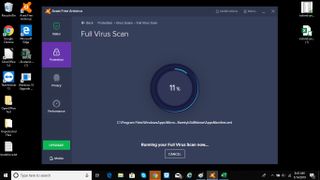
It took Avast an average of 1 hour, 22 minutes and 44 seconds to complete a Full Scan, slightly longer than AVG AntiVirus Free's Deep Scan result. Of the five free antivirus programs we looked at, only Microsoft Defender took longer. Avast's full-scan times also didn't shorten over time, unlike other programs that learn what to ignore and what to focus on.
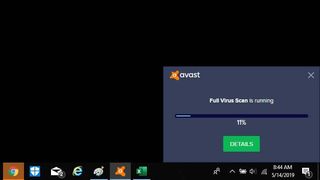
Avast Free Antivirus took 3 minutes and 9 seconds to run a Smart Scan, the equivalent of a quick scan that checks the most likely sectors to be infected. That's more than twice as long as AVG AntiVirus Free's similar Computer Scan.
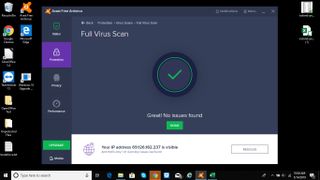
AV-Comparatives' Impact Score has a different take, with a score for Avast of 6.2. That ties its corporate cousin AVG for the best among the five programs we looked at. Microsoft Defender was the worst at 27.3.
Avast Free Antivirus: Interface
The interface for Avast Free Antivirus has a dark blue Status page with bright, easy-to-read text saying "You're Protected" when everything is right. When you need to address an issue, that turns to a red "X."
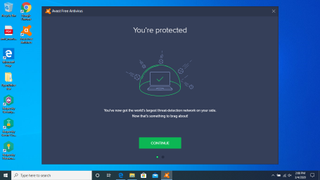
On the left is a column of major security activities, including categories for Protection (scanning, quarantine and Wi-Fi Inspector), Privacy (Passwords) and Software (updater and Do Not Disturb mode).
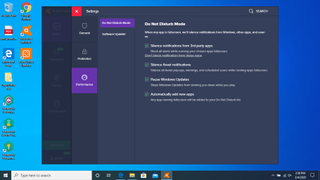
The Performance section has links for the Do Not Disturb mode, the Software and Driver Updater applets as well as what Avast calls Cleanup Premium. These features, however, only identify problems — you'll need to either pay for the downloadable applets, or get Avast's Premium package, to make changes.
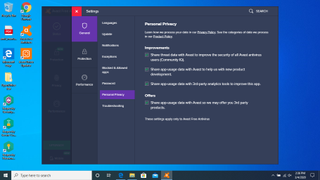
The Status screen also has a Menu link and a powerful Settings screen. In that, you can whitelist safe items and change the interface language; Avast still honors the seafaring with a Pirate Talk option.
Avast Free Antivirus lets you adjust its scanning sensitivity, turn major components on and off, customize its activities and opt out of having data collected from your system. If all you want to do is run Smart Scans, the Start button is part of the Status page. All other scans are two clicks away.
Avast Free Antivirus: Installation and support
Avast Free Antivirus' installation starts with a 223KB installer file that downloads the rest of the program, but be careful because it will also install the Google Toolbar in your web browser unless you opt out. All told, it took a little under 7 minutes to get and install the program.
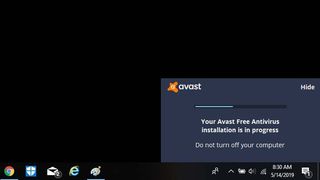
You don't need to set up an Avast online account to use Avast Free Antivirus, but it's a good idea because then you can monitor the status of all your systems running Avast software.
Like other free security programs, except for Microsoft Defender, Avast Free Antivirus offers no telephone tech support. But there are a lot of online resources, including installation help, tips and FAQs and a direct link from the program to the company's support pages.
Avast Free Antivirus: Bottom line
Avast Free Antivirus includes a full-featured password manager, a gaming mode and a Wi-Fi network scanner, which is great. But the software ultimately falls short on protection and performance.
Kaspersky Security Cloud Free offers better protection, a much lower performance hit, lots of customization and nearly as many extra features as Avast.
Brian Nadel is a freelance writer and editor who specializes in technology reporting and reviewing. He works out of the suburban New York City area and has covered topics from nuclear power plants and Wi-Fi routers to cars and tablets. The former editor-in-chief of Mobile Computing and Communications, Nadel is the recipient of the TransPacific Writing Award.
